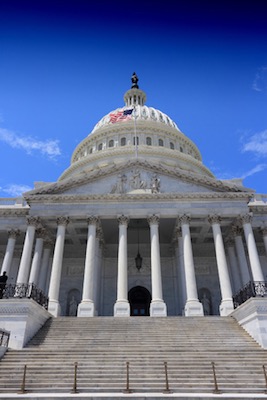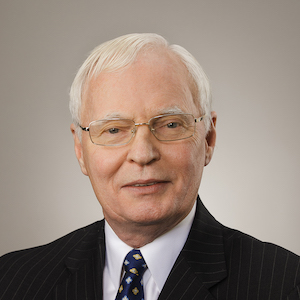 Almost 100% of the pre-election patent reform lobbying efforts were focused on the campaign, which did not prevail and thus on the morning of November 9 the patent community woke up to being well behind in getting a rapport established with the incoming administration. Don’t be fooled by the seductive image of a drained swamp, those of us in the pro-patent community will need to be pro-active in our engagement with Washington if we want patent reforms that meet our expectations.
Almost 100% of the pre-election patent reform lobbying efforts were focused on the campaign, which did not prevail and thus on the morning of November 9 the patent community woke up to being well behind in getting a rapport established with the incoming administration. Don’t be fooled by the seductive image of a drained swamp, those of us in the pro-patent community will need to be pro-active in our engagement with Washington if we want patent reforms that meet our expectations.
At a recent IP event here in Palo Alto, Calif., put on by the International IP Commercialization Counsel, industry heavyweights were perplexed as to how they should engage with the “new” Washington. The audience and the speakers bantered back and forth about how best to approach the coming new administration in the White House and how best to get the attention of Congress on key patent matters.
Some exclaimed, “Phone your congressman – he has to listen to you because we all pay his salary.” This approach has its own special dynamic that may lead to congressmen being sent in random directions due to the message diversity among all those who make contact. We will delve into this further below.
Others were more measured, suggesting a coordinated group effort with a focused message that would support the interests of the “pro-patent lobby over those of the efficient infringers.” Such infringers being those major entities who find it far easier to infringe than license due to the patent invalidation constructs that are now available to them and the continuing decline in damages they might ever be expected to pay. This particular approach was backed up by a representative of the National Venture Capital Association who described how they had formed a group to lobby key individuals on the Hill during the run up to the passage of the AIA and it was noted that from the vantage point of the USPTO at the time, this effort appeared to be effective.
Major patent holders like Google, Amazon, eBay and Facebook got moving quickly through their lobbying group, the Internet Association, and just six days after the election, wrote directly to President-elect Trump about their position on a collection of IP and patent reform issues. This group resides in the efficient infringer camp. Those pro-patent individuals, inventors and practitioners with different viewpoints were certainly not represented in their missive. Could it be that one of the pro-patent groups can be encouraged to take counterpoint and lead the charge on the pro-patent side of the discussion? Groups like the Innovation Alliance and Save the American Inventor appear to be well-positioned to step into this role. Ultimately, the hope is that Trump will have a greater affinity for such matters having managed his eponymous brand IP for years and as a real estate developer will have a greater appreciation for property rights of the intellectual kind (to the degree real estate metaphors apply).
Returning to the idea that we “all just call our congressman,” one can trot out the old chestnut that members of Congress fervently believe what the last person told them. Clearly our elected officials are more aware (and wary) than this and almost always depend on the position papers of their staff. When someone reaches them on such matters they typically ask their staff for background and usually receive well-researched answers. What this means for the pro-patent lobby outside of the efficient infringer group is that any coordinated effort needs to aim directly at informing and communicating with congressional staff who in some sense are the fact checkers and opinion developers for the elected officials they support. Any lobbying effort that overlooks them will fail.
At the recent IP Dealmakers Forum one war story was recounted where the story teller attempted to hold an informational gathering for congressional staff on one occasion (with free lunch) at a law office just across Independence Avenue from the Capitol. Almost no one came it was just too far to make it on their lunch hour (!). So one has to marshal an effort that leverages relationships in the House and takes advantage of available conference rooms within steps of where these folks work.
What is the take-away therefore about getting Congress to not only consider patent reform, but the key patent reform measures we all can agree on? I would suggest:
- A person or entity needs to be chosen to lead the cause;
- That person or entity needs to have relationships on the Hill among congressional leaders and staff;
- The top few reform issues need to be identified and agreed to by all and those need to be presented consistently, repetitively and broadly at the appropriate levels on the Hill;
- A communication plan and budget needs to be developed and ratified by those involved and an entity needs to be formed to be the coordinating contact point for outbound and inbound messaging.
The steps above may be obvious, but will be necessary as the efficient infringer lobby is certainly doing this through the lobbyists they have bought and paid for. During the last few weeks prior to the election the in-coming administration through their campaign spoke often about “draining the swamp” in Washington. Pay no attention to the equipment they are assembling to do this. My assessment is that it’s not pumps they are bringing in, but earth moving equipment to make the dikes higher so it won’t overflow. Yes, we will have to navigate the swamp once more if we have any hope of getting reforms that are reasonable and useful.

![[IPWatchdog Logo]](https://ipwatchdog.com/wp-content/themes/IPWatchdog%20-%202023/assets/images/temp/logo-small@2x.png)

![[Advertisement]](https://ipwatchdog.com/wp-content/uploads/2024/04/Patent-Litigation-Masters-2024-sidebar-early-bird-ends-Apr-21-last-chance-700x500-1.jpg)

![[Advertisement]](https://ipwatchdog.com/wp-content/uploads/2021/12/WEBINAR-336-x-280-px.png)
![[Advertisement]](https://ipwatchdog.com/wp-content/uploads/2021/12/2021-Patent-Practice-on-Demand-recorded-Feb-2021-336-x-280.jpg)
![[Advertisement]](https://ipwatchdog.com/wp-content/uploads/2021/12/Ad-4-The-Invent-Patent-System™.png)







Join the Discussion
2 comments so far.
Eric Berend
December 21, 2016 04:38 am“Yes, we must, indeed, all hang together, or most assuredly we will all hang separately” – B.Franklin
Now is truly, the time for all hands on deck. As an inventor who has seen the ground legislatively and legally yanked from under my feet, so to speak; I recognize that little will be gained by ignoring these impediments to successful prosecution of valid patents sought for the protection of genuine inventions; and, the path of trade secrets is perilous and contrary to the purposes of Patents’ very existence under the Constitution.
Can there be a working group organized, that could include local inventors or their representatives such as inventor meetups/groups from around the nation, to support outreach to Congressional staff, as suggested above?
President-elect Trump seems to pay greater attention to well established, prominent Americans. For instance, the recent visit by Leonardo DiCaprio regarding ‘green’ energy industrial interests. Might some person who is similarly prestigious and whose views hew towards patent property protection for actual inventors be found, to help present the positions of this working group or an allied organization, to the new Administration?
The forces of those interests in intellectual property infringement who have been and are unjustly enriched through the deliberately fraudulent misrepresentation successfully promulgated to the U.S. Congress, the Executive Branch and much of the U.S. Judiciary as supported by false authorities (free software advocates, Google, K Street lobbyists, Lemley, et al). This sea change did not institute itself overnight. There certainly is and have been a great deal of concerted operations in favor of the infringers and to the detriment of the inventors. Isn’t it time the inventors organized similarly, as well as can be, even despite a more modest wherewithal?
Chris Gallagher
December 20, 2016 04:32 pmGood points. The pro-patent coalition should unify as much as possible. They can effectively begin now by consistency referring (as you did ) to Innovation Act proponents as the “efficient infringer lobby”, and doing so with the same frequency our anti-patent proponents refer to pro-patent advocates as the “patent troll lobby”.. By itself this phraseology won’t win any battles, but it will memorably alert otherwise uninformed Members that politically, there are two sides to this debate and will open staff eyes to discovering the truth that instead simply buying into a “mythical troll crisis”. Once two sides are established, staff will then see the truth; that from patent policy viewpoint, the sound policy move is to strengthen our patent system not further weaken it.